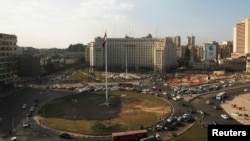Egypt’s Ministry of Education is removing from primary and secondary school curricula some religious texts and passages on historical Islamic figures including Saladin, the 12th century Muslim ruler who confronted the Crusaders and is widely viewed as an iconic hero in the Arab world.
The changes to primary and secondary school curricula, being touted by government ministers as a bid to counter radical Islamic ideologies, is provoking the ire of Islamists in the country.
Salafists say the deletions recommended by a curriculum development panel set up in March amount to the government declaring war on Islam. But the Prime Minister, Ibrahim Mehleb, who has endorsed the recommendations made after a brief review of textbooks says jihadists are exploiting outdated ideas to incite youngsters to violence.
Another historical figure getting deleted is Uqba ibn Nafi, the seventh century Arab general who led the Islamic conquest of the Maghreb for the Umayyad dynasty. According to legend, one of Uqba's soldiers stumbled across a golden goblet that had disappeared from Mecca, buried in the Tunisian sands and when he dug it up a spring appeared, the waters of which were said to have come from the sacred Zamzam Well in Saudi Arabia.
Some fatwas and Hadith (sayings of Prophet Muhammad) are also being omitted, including one saying, “I was ordered to fight people until they testify that there is no god but Allah.”
The leader of the Salafist Nour Party, Younis Makhyoun, has condemned the removal of Saladin and Uqba Ibn Nafi as “an assault on our history, an alteration of our identity and a surrender to our enemies.”
And Yasser al-Borhamy, the deputy head of the Salafist Call party, has called for the omissions to be restored, especially the story of Saladin, who liberated Jerusalem from the Crusaders in 1187. In a press statement he said: “The ministry does not have the right to ’alter the nations history and the biography of the Prophet just because it has illusions about them and under the pretext that these stories incite violence and killing. How do they have the audacity to delete the words of the Quran?”
But the country’s education ministry says, “Some of the material was inciting violence and was first entered into the curriculum during the Muslim Brotherhood's era.” Officials say the censoring of material used to encourage violence is part of a larger ideological battle the government is determined to wage against Islamic extremism.
This isn’t the first time the Egyptian government headed by former army commander President Abdel Fattah el-Sissi has removed content from national textbooks. This is the second round of changes since the Sissi-led army toppled Egypt's first freely-elected civilian President Mohamed Morsi of the Muslim Brotherhood after protests against his one-year rule.
In January, the education ministry oversaw changes in school psychology and sociology curricula and texts that, in their turn, had been altered previously by the Muslim Brotherhood government. One high school course removed was “The Difference Between a Revolution and a Coup.” Textbooks that include biographies of Islamist leaders were pulped and reprinted after amendments were made.
The changes are in line with a controversial speech the Egyptian president gave earlier this year before an audience of leading religious scholars calling for a “religious revolution” in Egypt. He said dominant Islamic thought had become too closed and antagonistic to the world. “It’s inconceivable that the thought that we hold most sacred should cause the entire nation to be a source of anxiety, danger, killing and destruction for the rest of the world,” he told the scholars.
President el-Sissi said Islam wasn’t the problem per se. The problem lay with “that corpus of texts and ideas that we have sanctified over the centuries, to the point that departing from them has become almost impossible.”
Some Egyptian historians and academics are critical of the latest textbook and curricula changes, warning that censorship distorts history. Or they argue far more serious strategic consideration should be given to the shaping of school curricula and education reform rather than piecemeal changes.
“Egypt’s current educational system is an incubator for extremism and radicalization,” says Samuel Tadros, an analyst with the Hudson Institute, a U.S. research organization. In a report published this month, he argued: “Attempting to address the question of intolerance, radicalization, and extremism in the Egyptian educational system must begin by addressing the very structure of that system and not merely changing curricula.”
He advocates retraining teachers and bringing under government control the country’s largest and most influential university, Al Azhar. Students studying at Al Azhar are “the most prone to radicalization among Egyptian students and are heavily exposed and indoctrinated in texts that increase intolerance of non-Muslims and the world,” he argues.
In Egypt, and across the region, textbooks and curricula are regularly altered to reflect prevailing political opinion and the ideology of those in power. In Libya, after the ouster of strongman Colonel Moammar Gadhafi, there was little effort to write accurate history to replace the distortions contained in the school and university curricula during his 42-year-long dictatorship.
The new rulers just wanted to forget the Gadhafi past and Islamists and progressives alike were eager to put their spin on the country’s history as they maneuvered to define the new Libya. Chapters on the Gadhafi years were just torn out of history textbooks.
Even before the Arab spring and its aftermath, Egyptian rulers have shaped curricula and textbooks to promote their ideas, glorify themselves and denigrate predecessors.
During the presidency of Gamal Abdel Nasser his predecessor the first president of the Egyptian republic, Mohammad Naguib, who he ousted, slowly disappeared from the nation’s history books. And during the rule of Anwar Sadat the importance of the 1952 coup that overthrew the country’s monarchy increasingly was played down in school textbooks to be replaced in significance by the 1973 October War against Israel.




